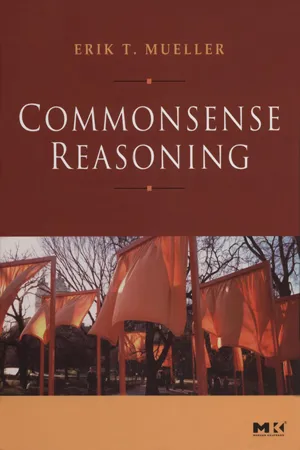
- 432 pages
- English
- ePUB (mobile friendly)
- Available on iOS & Android
Commonsense Reasoning
About this book
To endow computers with common sense is one of the major long-term goals of Artificial Intelligence research. One approach to this problem is to formalize commonsense reasoning using mathematical logic. Commonsense Reasoning is a detailed, high-level reference on logic-based commonsense reasoning. It uses the event calculus, a highly powerful and usable tool for commonsense reasoning, which Erik T. Mueller demonstrates as the most effective tool for the broadest range of applications. He provides an up-to-date work promoting the use of the event calculus for commonsense reasoning, and bringing into one place information scattered across many books and papers. Mueller shares the knowledge gained in using the event calculus and extends the literature with detailed event calculus solutions to problems that span many areas of the commonsense world.- Covers key areas of commonsense reasoning including action, change, defaults, space, and mental states.- The first full book on commonsense reasoning to use the event calculus.- Contextualizes the event calculus within the framework of commonsense reasoning, introducing the event calculus as the best method overall.- Focuses on how to use the event calculus formalism to perform commonsense reasoning, while existing papers and books examine the formalisms themselves.- Includes fully worked out proofs and circumscriptions for every example.
Tools to learn more effectively

Saving Books

Keyword Search

Annotating Text

Listen to it instead
Information
Table of contents
- Cover image
- Title page
- Table of Contents
- Praise for Commonsense Reasoning
- About the Author
- Copyright
- Dedication
- Foreword
- Preface
- Acknowledgments
- Chapter 1: Introduction
- PART I: Foundations
- PART II: Commonsense Phenomena
- PART III: Commonsense Domains
- PART IV: Default Reasoning
- PART V: Programs and Applications
- PART VI: Logical and Nonlogical Methods
- PART VII: Conclusion
- PART VIII: Appendices
- References
- Index
Frequently asked questions
- Essential is ideal for learners and professionals who enjoy exploring a wide range of subjects. Access the Essential Library with 800,000+ trusted titles and best-sellers across business, personal growth, and the humanities. Includes unlimited reading time and Standard Read Aloud voice.
- Complete: Perfect for advanced learners and researchers needing full, unrestricted access. Unlock 1.4M+ books across hundreds of subjects, including academic and specialized titles. The Complete Plan also includes advanced features like Premium Read Aloud and Research Assistant.
Please note we cannot support devices running on iOS 13 and Android 7 or earlier. Learn more about using the app